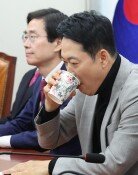What Rice Has Planned for North Korean Policy
What Rice Has Planned for North Korean Policy
Posted January. 19, 2005 23:02,
I will carry out the mission of the George W. Bush administration to propagate democracy to North Korea and work out a peaceful resolution for the North Korean nuclear issue in the framework of the six-party talks.
The basic framework of North Korean policy for the second term of the Bush administration that was revealed during the testimony by the Secretary of State nominee Condoleeza Rice given at the Senate Confirmation Hearing on January 18 (local time) can be summarized as the following.
The nominee also said, American diplomacy to help create a balance of power in the world that favors freedom (democracy). Though it is a hackneyed remark, it reaffirms that the Bush administration will maintain the basis for its North Korean policy for the second term.
In other words, while they mean to pursue co-existence with the neighboring countries, acknowledging their authorities and perspectives, they will not give up democratization, the American way, because of oppositions from other nations. Also, she proclaimed, The time for diplomacy is now.
Judging from the remarks of Rice in relation to the nuclear issue in North Korea and the six-party talks, the second Bush administration seems to be intent on keeping up with the multilateral approach to the issue. The secretary of state-to-be, however, did not stop there.
Though the focus will naturally be on eliminating the concrete threat, the nuclear capability of the North Korea for the time being, she also mentioned about the tasks to be done after the resolution of the nuclear issue in North Korea. It is to develop the function of the six-party talks from its current, simple purpose of resolving the nuclear issue to serve as the framework to supervise the North Korean regime.
Though Ms. Rice does not state it specifically, supervising the North Korean regime is analyzed to mean the regime transformation of North Korea through propagating democracy. The fact that the nominee referred to North Korea, along with Cuba, Myanmar, Iran, Belarus, and Zimbabwe as outposts of tyranny also falls along this context.
Rice described the North Korean regime as unreliable during some points in her remarks, and expressed sympathy towards North Korean citizens. This gives a hint of the second Bush administrations principle to consider the Kim Jong Il regime and North Korean people separately as it approach the issue in the future. In some sense, it could be an allusion of the policy of regime transformation of North Korea is leaning towards the replacement of the Kim Jong Il regime.
Some forecasts that the human rights issue of North Korea may gain momentum even prior to resolving the nuclear issue. In fact, the officials at the State Department, whom the reporter contacted at the end of last year, often said, We cannot delay in righting North Koreas perspective of the outside world.
In the end, it can be analyzed as the possibility of running pressurizing diplomacy with human rights issues in parallel this year according to the progress of the six-party talks. The State Department, in particular, will nominate a human rights ambassador to North Korea in April with the enforcement of the North Korean human rights act.
Seung-Ryun Kim srkim@donga.com







